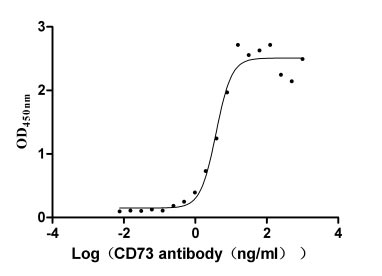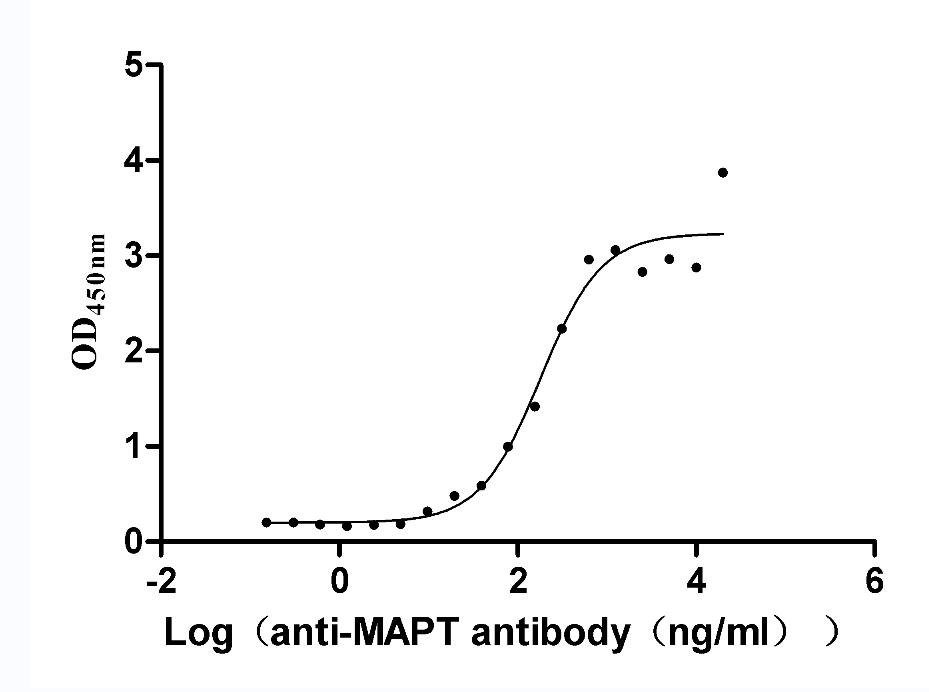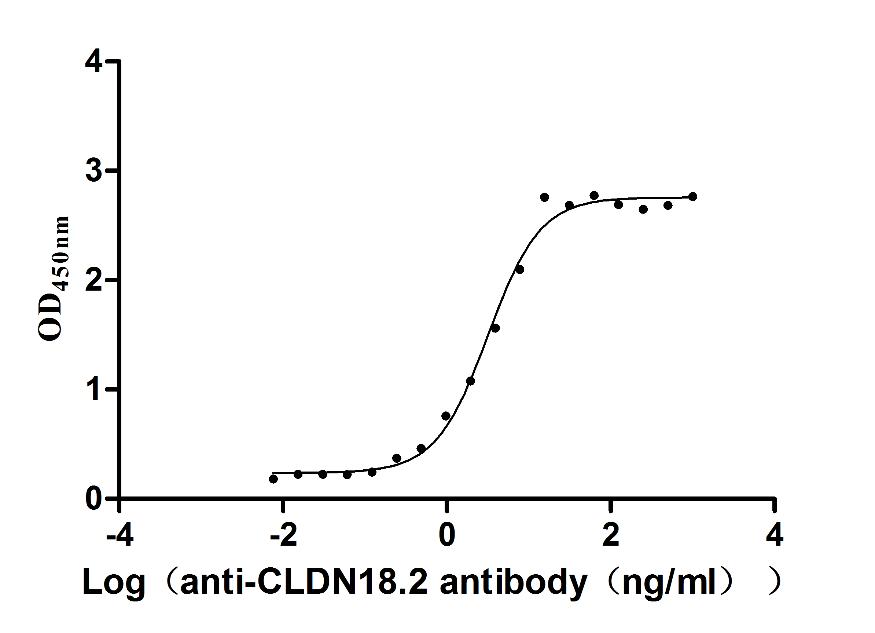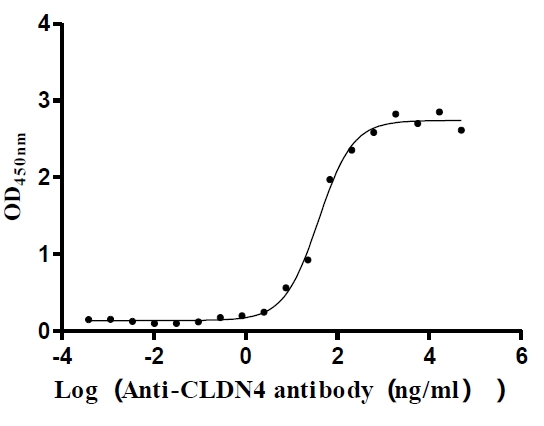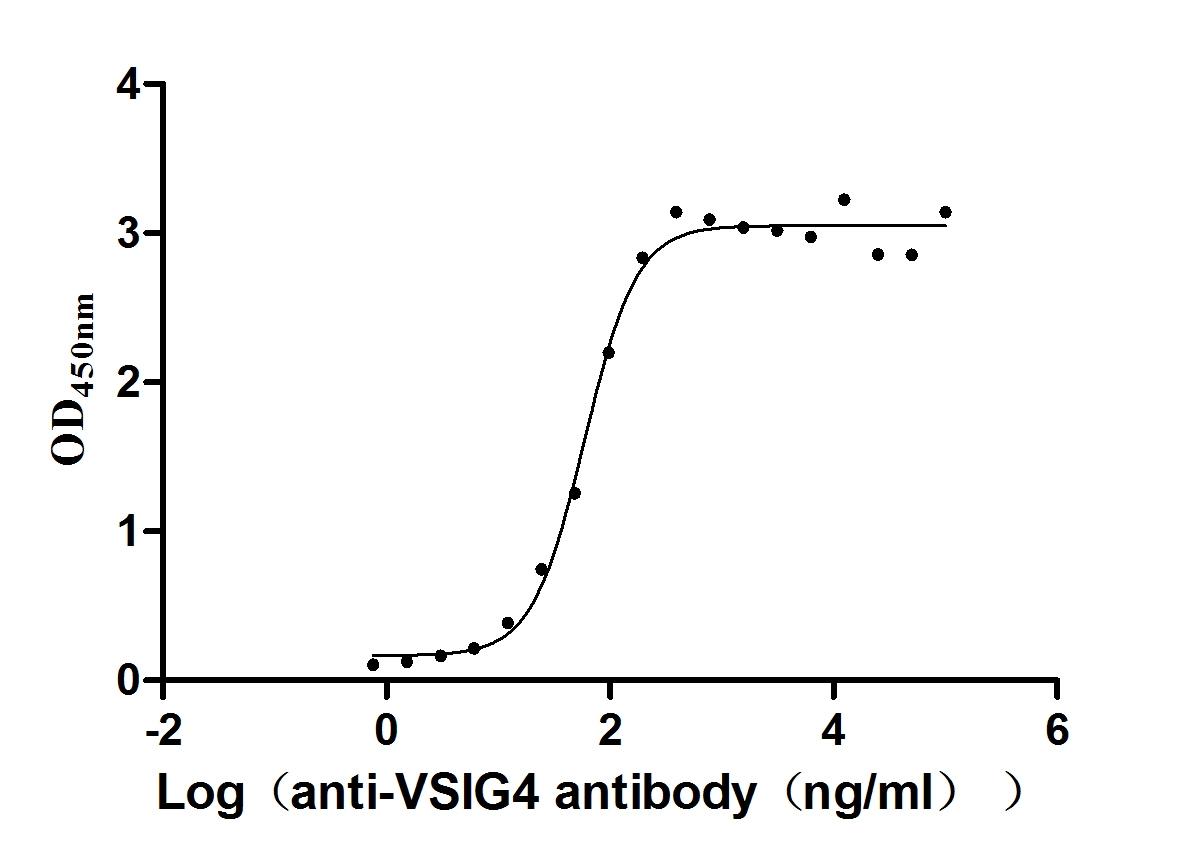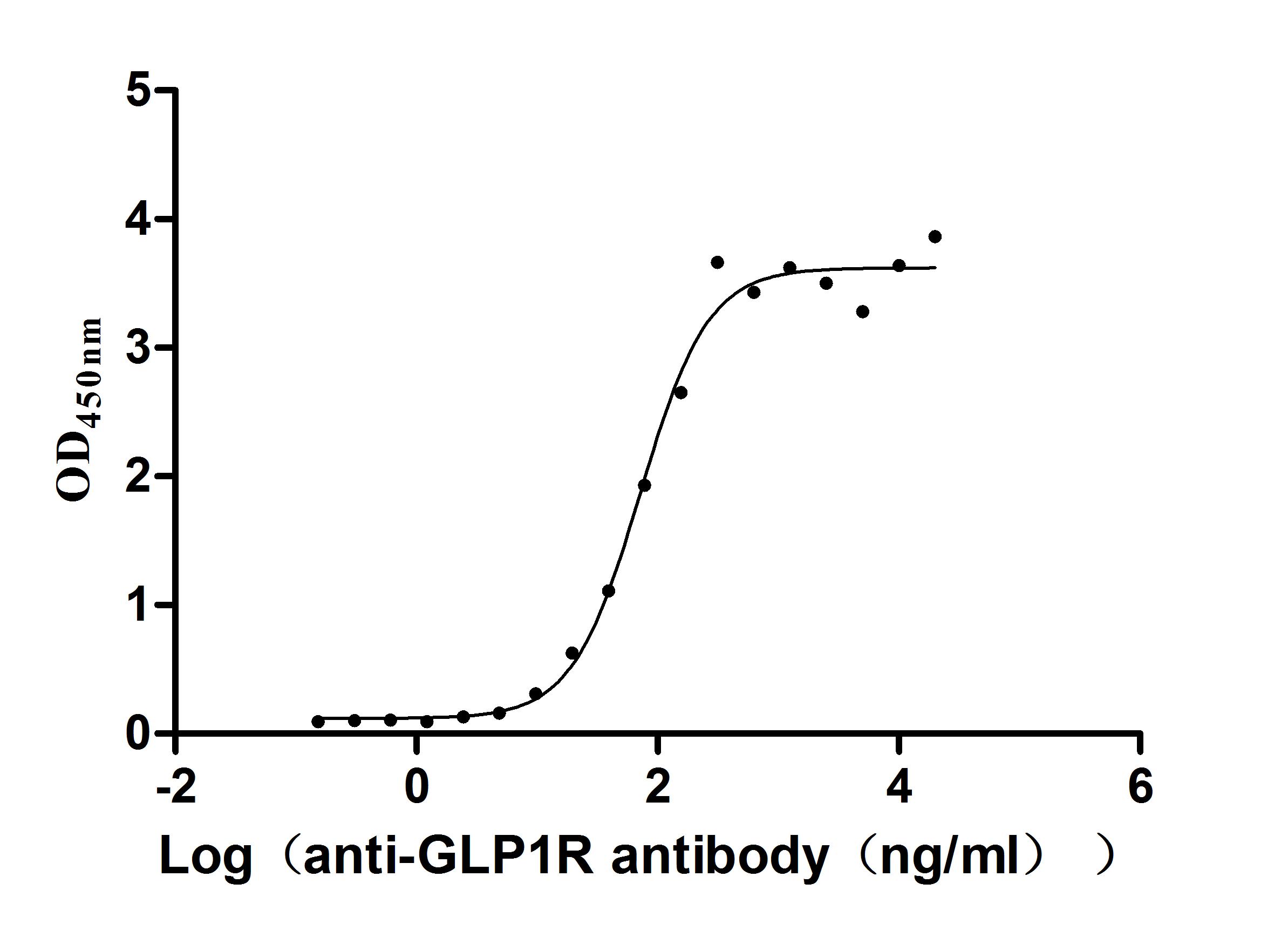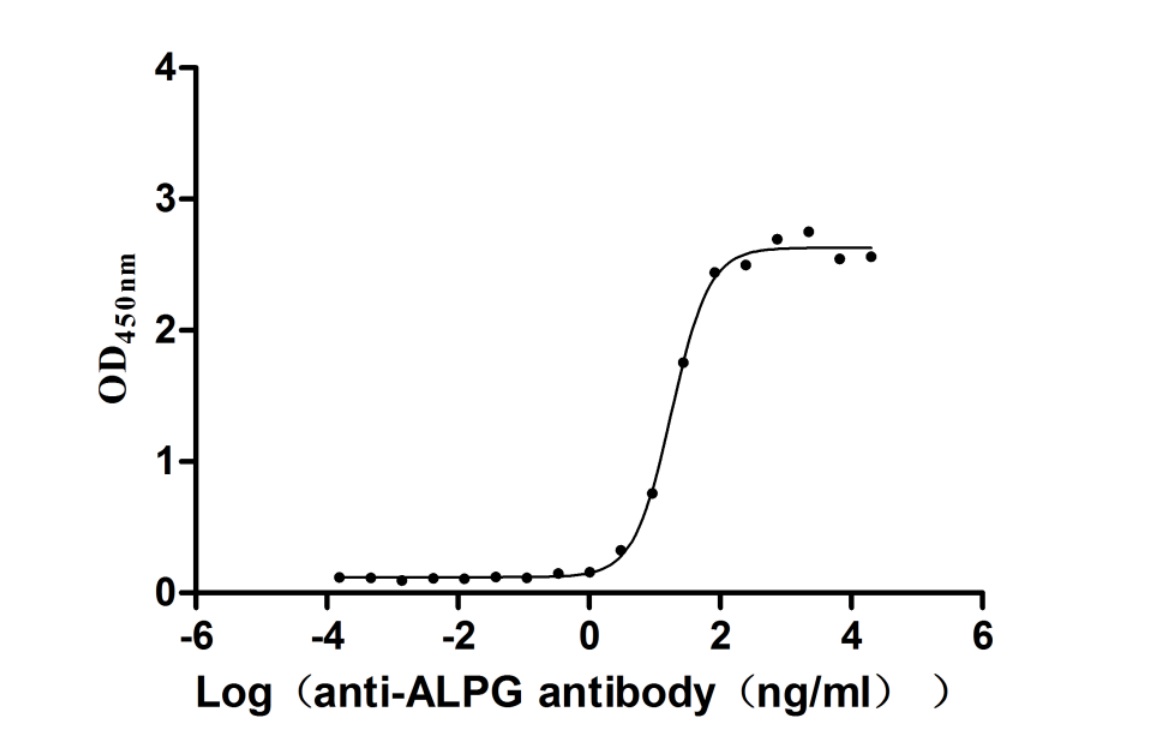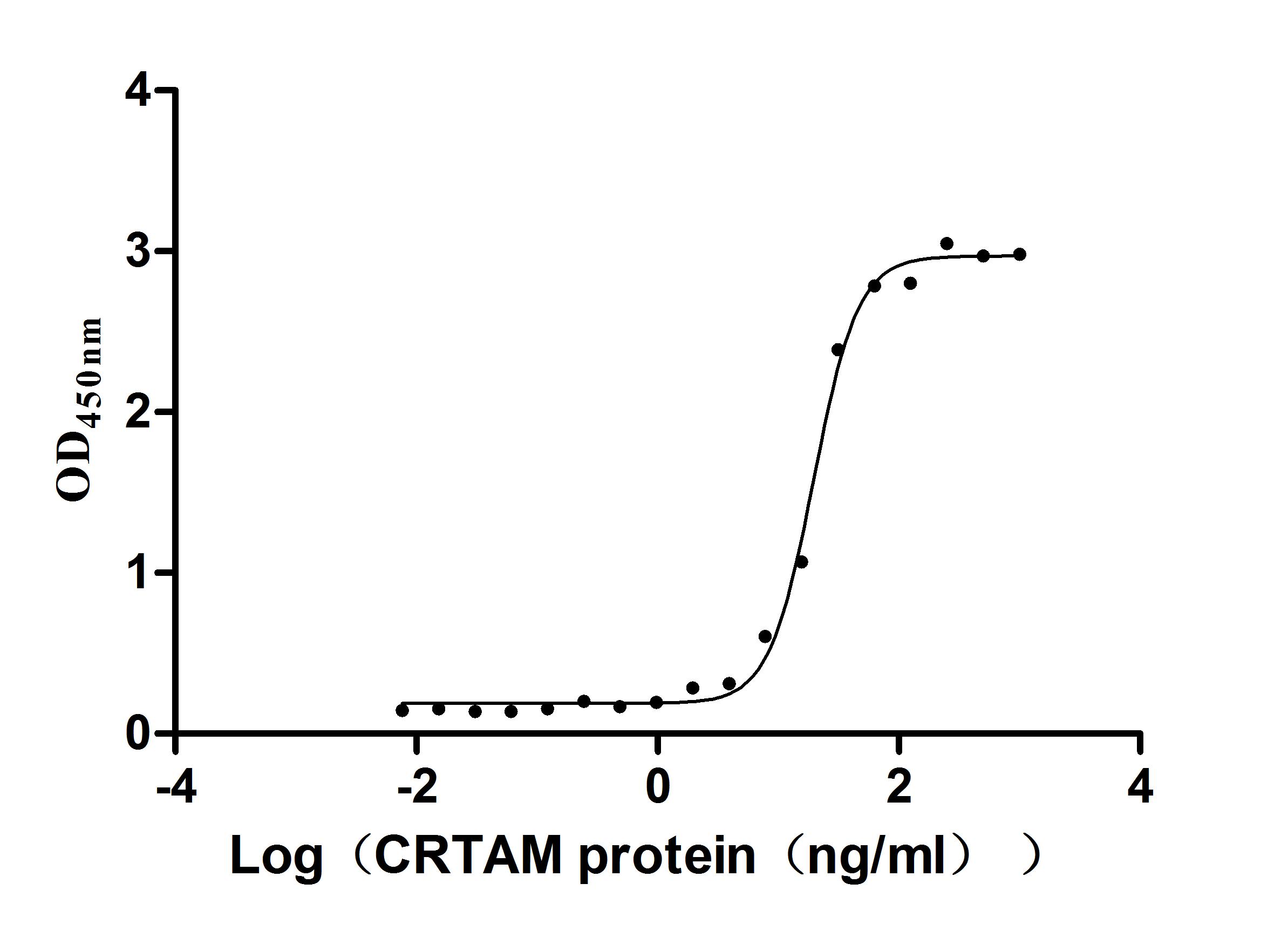Recombinant Rat Urotensin-2 (Uts2)
-
中文名称:大鼠Uts2重组蛋白
-
货号:CSB-YP870790RA
-
规格:
-
来源:Yeast
-
其他:
-
中文名称:大鼠Uts2重组蛋白
-
货号:CSB-EP870790RA
-
规格:
-
来源:E.coli
-
其他:
-
中文名称:大鼠Uts2重组蛋白
-
货号:CSB-EP870790RA-B
-
规格:
-
来源:E.coli
-
共轭:Avi-tag Biotinylated
E. coli biotin ligase (BirA) is highly specific in covalently attaching biotin to the 15 amino acid AviTag peptide. This recombinant protein was biotinylated in vivo by AviTag-BirA technology, which method is BriA catalyzes amide linkage between the biotin and the specific lysine of the AviTag.
-
其他:
-
中文名称:大鼠Uts2重组蛋白
-
货号:CSB-BP870790RA
-
规格:
-
来源:Baculovirus
-
其他:
-
中文名称:大鼠Uts2重组蛋白
-
货号:CSB-MP870790RA
-
规格:
-
来源:Mammalian cell
-
其他:
产品详情
-
纯度:>85% (SDS-PAGE)
-
基因名:Uts2
-
Uniprot No.:
-
别名:Uts2; Urotensin-2; Urotensin II; U-II; UII
-
种属:Rattus norvegicus (Rat)
-
蛋白长度:Cytoplasmic domain
-
表达区域:110-123
-
氨基酸序列Q HGTAPECFWK YCI
-
蛋白标签:Tag type will be determined during the manufacturing process.
The tag type will be determined during production process. If you have specified tag type, please tell us and we will develop the specified tag preferentially. -
产品提供形式:Lyophilized powder
Note: We will preferentially ship the format that we have in stock, however, if you have any special requirement for the format, please remark your requirement when placing the order, we will prepare according to your demand. -
复溶:We recommend that this vial be briefly centrifuged prior to opening to bring the contents to the bottom. Please reconstitute protein in deionized sterile water to a concentration of 0.1-1.0 mg/mL.We recommend to add 5-50% of glycerol (final concentration) and aliquot for long-term storage at -20℃/-80℃. Our default final concentration of glycerol is 50%. Customers could use it as reference.
-
储存条件:Store at -20°C/-80°C upon receipt, aliquoting is necessary for mutiple use. Avoid repeated freeze-thaw cycles.
-
保质期:The shelf life is related to many factors, storage state, buffer ingredients, storage temperature and the stability of the protein itself.
Generally, the shelf life of liquid form is 6 months at -20°C/-80°C. The shelf life of lyophilized form is 12 months at -20°C/-80°C. -
货期:Delivery time may differ from different purchasing way or location, please kindly consult your local distributors for specific delivery time.Note: All of our proteins are default shipped with normal blue ice packs, if you request to ship with dry ice, please communicate with us in advance and extra fees will be charged.
-
注意事项:Repeated freezing and thawing is not recommended. Store working aliquots at 4°C for up to one week.
-
Datasheet :Please contact us to get it.
靶点详情
-
功能:Highly potent vasoconstrictor.
-
基因功能参考文献:
- Aldosterone and its receptors were expressed on tunica adventitia. Urotensin II promoted ALD protein secretion from cells in a dose and timedependent manner. PMID: 29257277
- IRF3 expression and activation depend on the signal transduction of the the urotensin II/urotensin receptor (UII/UT) system, and play important roles in UII/UT-mediated immune inflammatory injury in the liver PMID: 27448985
- This study investigated possible role of U-II and its receptor expression in inflammation by using UTR agonist and antagonist in carrageenan induced acute inflammation PMID: 27208703
- results suggest that GRK5 may be involved in a UII-mediated hypertrophic response via activation of NF-kappaB and HDAC5 at least in part by ERK1/2 and GSK3alpha/beta-independent pathways. PMID: 27613164
- This study investigates the role and mode of action of urotensin II (U II) in the occurrence and progression of cardiac fibrosis in a pressureoverload rat model. PMID: 26323194
- Urotensin II expression was increased significantly in brain from focal cerebral ischemia animals. PMID: 24878476
- The UII/UT system mediates upregulation of proinflammatory cytokines through p38 MAPK and NF-kappaB pathways in LPS-stimulated Kupffer cells. PMID: 25803040
- MDA-MB-231 displayed a statistically significant higher sigma-2 receptor expression and also was the most sensitive cell line evaluated to SW IV-134 PMID: 26453012
- Study demonstrated that UII and URP binding sites are totally overlapping and that these sites were functional in regions bordering the fourth ventricle; data support a role for UII/URP at the interface between brain parenchyma and cerebrospinal fluid PMID: 24478001
- U-II increases cytosolic Ca(2+) concentration in cardiac vagal neurons of nucleus ambiguus via 2 pathways: Ca(2+) release from the ER via INSP3 receptor; and Ca(2+) influx through P/Q-type Ca(2+) channels. PMID: 24521102
- Hypoxia in cardiomyocytes increases UII and collagen I expression through the induction of AngII, ROS, and the JNK pathway causing cardiomyocyte hypertrophy and fibrosis. PMID: 24481965
- The current study provides new evidence that Urotensin II (UII) is involved in the TGF-beta mediated mitogenic effect on ASMCs. UII, at least partially, uses ERK pathway to render such effect. PMID: 22270542
- U-II and URP can differentially modulate nuclear UT functions such as gene expression, and both ligands can reach the internal cellular space through a receptor-independent mechanism PMID: 22044114
- The expression of U II and Uts2R in right ventricle arteries and right ventricle myocytes increases significantly during the formation of pulmonary hypertension and right ventricle hypertrophy in rats chronically exposed to hypoxia-hypercapnia. PMID: 21186587
- Transforming growth factor-beta1 involved in urotensin II-induced phenotypic differentiation of adventitial fibroblasts from rat aorta. PMID: 22166643
- In diethylnitrosamine-induced precancerous liver lesions, the UII/UT system was up-regulated, which may contribute to the pathogenesis of liver cancer through a PKC- or ERK1/2-dependent pro-mitogenic pathway in an autocrine/paracrine manner. PMID: 21056072
- UII infusion elevates portal pressure and induces hepatic fibrosis in normal rats. PMID: 19797237
- In the arcuate and paraventricular nuclei, where expression is high and moderate, U-II produces a pressor/tachycardic response in the former and a weaker response in the latter PMID: 20422157
- The expression of urotensin 2 is increased in airways of rat asthmatic models and of patients with asthma. PMID: 17045018
- The plasma levels of urotensin II, NO, and C-type natriuretic peptide in rats with hypoxia-induced pulmonary hypertension were higher than those in the control group. PMID: 16677483
- The results obtained indicate that U-II may exert its effects as a neuromodulator in chromaffin cells. PMID: 20025629
- investigation of role of U-II in intimal hyperplasia after vascular injury during balloon angioplasty in thoracic aorta model: upregulation of U-II receptor, increased collagen accumulation, increased cell proliferation PMID: 19930425
- These results suggest that the U-II and UT play an important role in the diabetic angiopathy especially in the large artery and maybe imply a new way to prevent the injury of artery in diabetes type 2 PMID: 19906507
- the ERK and Rho kinase pathways, but not the PI3 pathway, may be involved in the central pressor action of urotensin II in conscious rats. PMID: 15097239
- UII plays a role in the regulation of REM sleep independently of its cerebrovascular actions by directly activating cholinergic brainstem neurons PMID: 15944374
- These findings demonstrate upregulation of UII following balloon angioplasty, and a significant reduction in intimal lesion in response to UT receptor blockade. PMID: 16171813
- Real-time PCR demonstrated the expression of UII and UT-R mRNAs in both dispersed and in vitro cultured rat adrenocortical cells. PMID: 16685423
- UII may also play a role in renal disease, being elevated in the circulation or urine of patients with renal failure and in experimental models of cardiovascular disease such as the spontaneously hypertensive rat. PMID: 16807543
- Urotensin 2 is a species-form-specific coronary vasodilator. PMID: 17097764
- Data suggest that urotensin II and urotensin II-related peptide reduce cardiac ischemia-reperfusion injury by increasing flow through the coronary circulation, reducing contractility and energy demand, and inhibiting reperfusion myocardial damage. PMID: 17900760
- Urotensin II expression is significantly enhanced in the myocardium of rats with diabetes in both mRNA and protein levels. PMID: 18280445
- mediator of splanchnic vasodilation, portal hypertension and renal sodium retention in cirrhotic bile duct-ligated rats PMID: 18318439
- Data suggest that functional interaction between urotensin II and GABA(A) receptors negatively regulates coupling of UT to the classical PLC/IP(3) signaling cascade as well as to the adenylyl cyclase/PKA pathway. PMID: 18355946
- may stimulate adventitial fibroblasts phenotypic conversion, migration, and collagen I synthesis through the protein kinase C, mitogen-activated protein kinase, calcineurin, Rho kinase, and/or Ca2+ signal transduction pathways PMID: 18475149
- Diabetes-induced upregulation of urotensin 2 and GPR14, most likely through autocrine and/or paracrine mechanisms, plays an important role in TGF-beta1-mediated renal fibrosis and dysfunction. PMID: 18796544
- UII may act as an autocrine/paracrine factor through its receptor and the Ca(2+) channel, protein kinase C, and mitogen-activated protein kinase signal transduction pathways, in the pathogenesis of vascular remodeling by activating vascular adventitia. PMID: 18955090
- The gene expression of the UII system in the heart and aortae may have certain pathophysiological roles in hypertension. PMID: 19463745
显示更多
收起更多
-
亚细胞定位:Secreted.
-
蛋白家族:Urotensin-2 family
-
组织特异性:Brain specific.
-
数据库链接:
Most popular with customers
-
Recombinant Human 5'-nucleotidase (NT5E) (Active)
Express system: Mammalian cell
Species: Homo sapiens (Human)
-
Recombinant Rat Microtubule-associated protein tau (Mapt) (Active)
Express system: Mammalian cell
Species: Rattus norvegicus (Rat)
-
Recombinant Macaca fascicularis Claudin 18.2 (CLDN18.2)-VLPs (Active)
Express system: Mammalian cell
Species: Macaca fascicularis (Crab-eating macaque) (Cynomolgus monkey)
-
Recombinant Human Claudin-4 (CLDN4)-VLPs (Active)
Express system: Mammalian cell
Species: Homo sapiens (Human)
-
Recombinant Human V-set and immunoglobulin domain-containing protein 4 (VSIG4), partial (Active)
Express system: Mammalian cell
Species: Homo sapiens (Human)
-
Recombinant Human Glucagon-like peptide 1 receptor (GLP1R), partial (Active)
Express system: Mammalian cell
Species: Homo sapiens (Human)
-
Recombinant Human Alkaline phosphatase, germ cell type (ALPG) (Active)
Express system: Mammalian cell
Species: Homo sapiens (Human)
-
Recombinant Human Cell adhesion molecule 1 (CADM1), partial (Active)
Express system: Mammalian cell
Species: Homo sapiens (Human)


